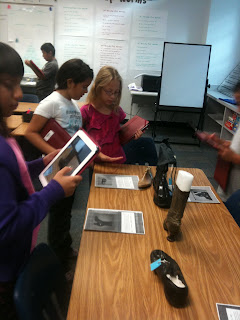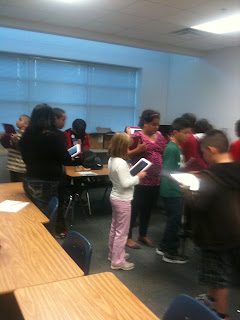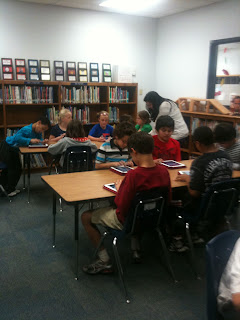I hope that you all have a wonderful Winter Break and a Happy New Year! See you next year! School resumes on January 8, 2013.
Friday, December 21, 2012
Holiday Sing-along
Scholars had fun listening to eConcert recordings and singing along to Holiday tunes. They also listened to several teachers, including all fourth grade teachers, perform as a choir and play bells! Finally, scholars sang, "The Twelve Days of Christmas." Check out the video, recorded by Ms. Berumen, our librarian/media specialist! Below are the eConcert recordings!
Thursday, December 20, 2012
"Singing zoologist" Performance
Author, songwriter, and "singing zoologist," Lucas Miller, performed at Cannon today. He sang fun songs about animals, and scholars also learned about the food chain and the harmful effects of DDT on bald eagle populations.
Scholars quickly picked up on the words to songs, participated in using hand-motions, and enjoyed the music!
Check out Lucas Miller's website and music on YouTube.
Scholars quickly picked up on the words to songs, participated in using hand-motions, and enjoyed the music!
Check out Lucas Miller's website and music on YouTube.
Grapevine Wastewater Treatment Plant
Today, scholars toured the Grapevine Wastewater Treatment Plant. They learned all about the chemical and filtration methods used to treat the water in Grapevine!
Lake Water Treatment
At the Grapevine and TRA water treatment plants, the lake water goes through several treatment processes where chemicals such as chlorine, ozone, alum, fluoride, caustic soda, ammonia, potassium permanganate and polymer are added to purify the water. After the water is purified, it is pumped into your homes through more than 280 miles of distribution pipelines.
Source: 2011 City of Grapevine Annual Drinking Water Quality Report
Lake Water Treatment
At the Grapevine and TRA water treatment plants, the lake water goes through several treatment processes where chemicals such as chlorine, ozone, alum, fluoride, caustic soda, ammonia, potassium permanganate and polymer are added to purify the water. After the water is purified, it is pumped into your homes through more than 280 miles of distribution pipelines.
Source: 2011 City of Grapevine Annual Drinking Water Quality Report
Monday, December 17, 2012
Learning Objectives - Week 16
Reading:
I can identify the subject and verb in a complete sentence.
I can write compound sentences using FANBOYS.
Writing:
I can write to explain why someone is special to me.
I can carefully choose my details to support my controlling idea.
This week:
* No Reading Log or Spelling Test this week
* We have a field Trip on Thursday.
* Our Holiday Party is on Friday at 10:30. Parents are welcome. Scholars needs to bring $2.00 for food and a wrapped book for a book exchange.
I can write compound sentences using FANBOYS.
Writing:
I can write to explain why someone is special to me.
I can carefully choose my details to support my controlling idea.
This week:
* No Reading Log or Spelling Test this week
* We have a field Trip on Thursday.
* Our Holiday Party is on Friday at 10:30. Parents are welcome. Scholars needs to bring $2.00 for food and a wrapped book for a book exchange.
Labels:
Learning Objectives
Reading and Writing News from Mrs. Lambert
In Reading Workshop, scholars have practiced identifying how writers develop characters to support the theme/central idea. We've studied character traits, problem/goals of the characters, and relationships between characters. Scholars also learned about how to use a Plot Diagram (Exposition, Rising Action, Climax, Falling Action, and Resolution) to map out the events in a story. You can help your child to keep up with these skills by asking them questions about the characters in the stories that they are reading. You could ask them to describe the characters, why they do what they do, and ask if they've reached the climax/turning point in their story.
We recently have been analyzing text structures (sequence, descriptive, compare/contrast, cause/effect, or problem/solution). We’ll continue to discuss the function of these organizational structures and explain how they support the writer’s purpose. In the Learning Links section of my website, there are text structures resources and games that scholars have used in my class to practice identifying these text structures using signal words. Scholars will soon learn about the structural elements particular to dramatic literature, including dialogue, script elements (e.g., acts, scenes, cast of characters, stage direction), and discussing their functions and how these elements move the plot along.
In Writing Workshop, scholars have continued to practice planning and writing personal narrative compositions using “Freeze Time” to Focus, Explain, Describe, and Connect to their controlling idea. They have been working specifically to Explain and Describe to the reader what they were thinking, sensing, and feeling, and they describe the physical responses to their emotions. Scholars have focused on recognizing their attitude/stance toward the experience that they are writing about (e.g., I was proud when I scored my first goal) and using their details to support this controlling idea.
We most recently have been discussing what makes someone a hero as we shift back into expository writing. Scholars are planning their expository essays by using “Freeze Time” to establish a clear position in their introduction and Focus sentences (the first sentence of each paragraph), Explaining and Describing their reasoning, and Connecting to their central idea.
At this time, we are also starting more formal grammar mini-lessons to improve punctuation in their writing. By Winter Break, students will have reviewed nouns and verbs, what makes a complete sentence, subject and predicate, subject-verb agreement, and "FANBOYS" conjunctions (for, and, nor, but, or, yet, so). We will continue to practice these grammar skills through mini-lessons and through revising and editing of their writing.
We recently have been analyzing text structures (sequence, descriptive, compare/contrast, cause/effect, or problem/solution). We’ll continue to discuss the function of these organizational structures and explain how they support the writer’s purpose. In the Learning Links section of my website, there are text structures resources and games that scholars have used in my class to practice identifying these text structures using signal words. Scholars will soon learn about the structural elements particular to dramatic literature, including dialogue, script elements (e.g., acts, scenes, cast of characters, stage direction), and discussing their functions and how these elements move the plot along.
In Writing Workshop, scholars have continued to practice planning and writing personal narrative compositions using “Freeze Time” to Focus, Explain, Describe, and Connect to their controlling idea. They have been working specifically to Explain and Describe to the reader what they were thinking, sensing, and feeling, and they describe the physical responses to their emotions. Scholars have focused on recognizing their attitude/stance toward the experience that they are writing about (e.g., I was proud when I scored my first goal) and using their details to support this controlling idea.
We most recently have been discussing what makes someone a hero as we shift back into expository writing. Scholars are planning their expository essays by using “Freeze Time” to establish a clear position in their introduction and Focus sentences (the first sentence of each paragraph), Explaining and Describing their reasoning, and Connecting to their central idea.
At this time, we are also starting more formal grammar mini-lessons to improve punctuation in their writing. By Winter Break, students will have reviewed nouns and verbs, what makes a complete sentence, subject and predicate, subject-verb agreement, and "FANBOYS" conjunctions (for, and, nor, but, or, yet, so). We will continue to practice these grammar skills through mini-lessons and through revising and editing of their writing.
Monday, December 10, 2012
Learning Objectives - Week 15
Reading:
I can write with different text structures.
I can identify the subject and verb in a complete sentence.
I can write compound sentences using FANBOYS.
Writing:
I can write to explain why someone is special to me.
I can carefully choose my details to support my controlling idea.
Labels:
Learning Objectives
Friday, December 7, 2012
Narrative Freeze Time
Scholars in our Wacky Wednesday Writing groups worked together to practice Freeze Time to describe their thinking, sensing, and feelings at the turning point of a narrative story. We compiled ideas from each group to write on the whiteboard!
Historical Shoes Research and Writing
Scholars explored shoes from throughout history and wrote about what they imagined life was like for the shoes' owners!
Subscribe to:
Comments (Atom)
.JPG)




















































